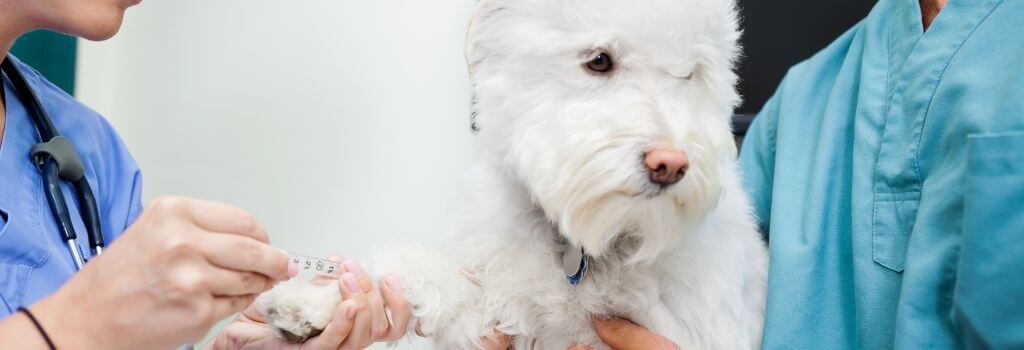We all want our dogs and cats to live long and healthy lives, but what if I told you that there was a chance that your pet could be suffering from silent health issues that you may not even notice? Though your pet may be acting like their normal, energetic, and affectionate self, the truth is, they could be sick or in pain without you even realizing it.
If that concerns you, rest assured there's something your veterinarian can do to ease your mind and make sure your pet is in good health: an annual pet blood test.
Pet bloodwork is one of the most powerful – and insightful – aspects of preventive care for both dogs and cats that could even save your pet's life. In this blog, I'll explain why every pet should be getting bloodwork done annually and what health conditions it can help veterinarians identify and treat before they become serious.
Why Annual Bloodwork Can Be Life-Saving for Your Pet
When it comes to keeping your pet in good health and getting the best outcomes for any health scares that do happen, early detection and intervention are the name of the game. So many of the painful and dangerous health conditions that our pets can suffer from during their lifetime are often easily treated or managed if caught early enough – and that's where annual pet bloodwork comes in.
Annual bloodwork is one of the best ways to establish a baseline for your pet's health and give your veterinarian an idea of what your dog or cat's "normal" is when it comes to blood chemistry and organ function. Having reliable baselines for a pet's health is incredibly important in veterinary medicine, as it gives your veterinary care team a reference point to refer back to in the event that your pet does become ill or starts displaying concerning behaviors or symptoms.
When health conditions are caught early, your veterinarian can:
- Start treatment before damage becomes severe (like in kidney disease or diabetes)
- Prevent complications from worsening or spreading (such as infections or tumors)
- Slow the progression of chronic diseases, giving pets a longer, healthier life
- Avoid emergency situations that are stressful, costly, and sometimes less treatable
- Improve your pet's quality of life with earlier pain management or supportive care
In some cases, this early intervention can even save your pet's life. Since pets can't directly communicate with us and tell us that they are sick or that something is wrong, serious illnesses can often progress – and even take the lives of pets – without owners even realizing it. For example, if a cat with chronic kidney disease goes undiagnosed because it appeared asymptomatic and wasn't regularly going to the vet or having bloodwork done, there is a good chance that it could pass away prematurely from organ failure or other complications of the disease.
No veterinarian or owner wants that fate for an animal, so staying on top of regular cat and dog bloodwork needs cannot be recommended enough.

Pet Blood Tests and What They Can Detect
Typical pet blood tests that are performed annually are a Complete Blood Count, a Blood Chemistry Panel, and, for seniors, a thyroid panel.
- Complete Blood Count (CBC) checks for infections, inflammation, anemia, and blood-related cancers by evaluating red and white blood cells and platelets. This essentially tells us what the blood is doing in the body, and can show us if there are signs of infections, anemia, or even possible signs of dehydration.
- A blood chemistry panel provides a veterinarian with a complete look at your pet's organ function, often revealing signs of kidney disease, liver disease, diabetes, pancreatitis, and electrolyte imbalances.
- A thyroid panel measures the levels of thyroid hormones — primarily T4 (thyroxine) — in your pet's blood. Imbalances in T4 levels in cats and dogs can indicate thyroid dysfunction and signal to a veterinarian that a pet may have hypothyroidism (low levels of T4) or hyperthyroidism (high levels of T4), which can both lead to unwanted secondary health complications.
Common Conditions Detected by Cat & Dog Bloodwork
Annual pet blood tests are crucial and highly recommended by veterinarians because of the multitude of health conditions and concerns that they can identify. The tests we discussed above can help veterinarians uncover early signs of disease — even when your dog or cat appears perfectly healthy — giving them a head start in treating or managing health conditions.
A Complete Blood Count can help veterinarians identify a number of health concerns, including:
- Anemia
- Infections (bacterial, viral, or parasitic)
- Inflammation
- Immune system disorders
- Certain types of cancer
While Blood Chemistry Panels can tip veterinarians off the presence of:
- Kidney disease
- Liver disease
- Diabetes
- Pancreatitis
- Electrolyte imbalances
These more common conditions are typically easier for veterinarians to identify and regularly affect thousands of pets each year. However, there are also some rarer and harder-to-diagnose conditions that regular pet blood tests can help your veterinarian identify and run additional tests to confirm an official diagnosis. A few of these conditions that we see in our clinic include:
- Addison's Disease (Hypoadrenocorticism): This disease is a hormonal disorder that occurs when the adrenal glands don't produce enough essential hormones like cortisol and aldosterone. Bloodwork for pets with Addison's Disease will often show low sodium and high potassium, low blood sugar, anemia, and dehydration or abnormal kidney function.
- Cushing's Disease (Hyperadrenocorticism): Unlike Addison's Disease, this condition occurs when the body produces too much cortisol, often due to a tumor in the pituitary or adrenal gland. Bloodwork may show elevated liver enzymes, high cholesterol, high blood sugar, and increased white blood cells.
- Valley Fever (Coccidioidomycosis): This condition is a fungal infection found in dry, dusty areas like the southwestern U.S. Pets inhale the fungal spores, which can cause respiratory symptoms and, in some cases, spread to other parts of the body like bones or the brain. Bloodwork will often show an elevated white blood cell count, high globulins, and signs of inflammation or infection, leading veterinarians to call for a Valley Fever antibody test or chest X-rays to confirm the infection.
What to Expect When It's Time for a Pet Blood Test
Aside from the benefits of being able to keep tabs on your pet's health and being able to intervene early if something is wrong, the best thing about an annual pet blood test is that it's quick and virtually painless for your pet. Let's break down what you can expect once your veterinary care team recommends a pet blood test.
For annual blood work, samples will be collected during your pet's yearly wellness visit. A veterinary technician or the veterinarian themselves will gently draw a small amount of blood using a fine needle – something your pet will barely feel.
Once the sample has been collected, a member of the veterinarian team will take it to an in-house lab or a partner laboratory for analysis. During our analysis, we look at the trends of your pet's specific blood values to look at any changes that could show early health issues. For regular bloodwork findings, it can take 24-48 hours for results to become available, so you won't receive results during your initial visit, but most veterinarians will reach out within a few days to let you know if everything looks good or if there were any concerning findings in your cat or dog's bloodwork or any trends or changes that warrant a change in care or a closer look.
In addition to regular pet blood tests, your veterinarian may recommend some additional testing and lab work to address concerning trends or irregular findings. The recommendations your veterinarian makes can depend on your pet's age, health status, and what kind of abnormalities were discovered in the blood work or other diagnostic procedures. Depending on the abnormality, we may have to do further diagnostic tests like urinalysis or radiographs to rule out certain conditions with overlapping symptoms.

Do Cats Need Annual Blood Work?
The short answer is yes!
When we talk about annual vet visits and lab work, many pet owners will assume we're really just talking about these needs for dogs – but that couldn't be further from the truth. Many people incorrectly assume that cats don't need as much veterinary care as dogs because they are low maintenance and aren't as exposed to disease and illness as their canine counterparts. These beliefs lead to many cats in the United States not receiving annual veterinary care, like wellness checkups, vaccinations, and routine bloodwork for cats. In fact, at one point, it was estimated that half of the cats in the U.S. did not visit a veterinarian annually for wellness and preventive care.
Cats are exceptionally good at hiding pain and illnesses from their owners and even veterinarians, making regular checkups and lab work an absolute necessity to keep them in good health. Just like for dogs, getting cat bloodwork done regularly can help your veterinarian identify any concerning changes or trends in your cat's health and address them before they become serious.
Special Exceptions for Senior Pets
While regular pet blood tests are important for every dog and cat, senior pets benefit the most from routine bloodwork as they are more prone to age-related diseases. Younger pets without chronic health conditions can typically stick to a yearly schedule for cat and dog bloodwork, but senior pets should have a blood test done every six months to help veterinarians catch diseases early and ensure that any concerning symptoms are normal signs of aging, and not something more serious.
For example, more frequent bloodwork is highly recommended for senior cats, as they are prone to developing kidney disease and hyperthyroidism as they age, and some of the symptoms of these two diseases can commonly be missed by pet owners or incorrectly attributed to the cat getting older.
Don't Forget to Schedule an Annual Pet Blood Test – Your Pet Deserves the Best Care
Routine bloodwork is a great investment in your pet's health and a good way to catch health issues early. Early detection means early intervention for health issues that could cause your pet pain or even shorten its lifespan. So get your pet the preventive care they deserve, and be sure to stay on top of yearly wellness checkups and the tests and examinations that come with them!
Don't have a vet in your area yet? We can help you find a local veterinarian.
If you have more questions, the GeniusVets Teletriage platform will give you unlimited access to text and/or video calls with board-certified veterinarians! To learn more click here.
This information was first seen on Crown UrgentVet.


The Ultimate Guide
to Dog Care
This free guide is an indispensable manual for dog ownership. Filled with veterinary advice and recommendations on every important topic at each stage of your dog’s life, this is all the stuff that responsible dog owners need to know. That is why we are making it free!
